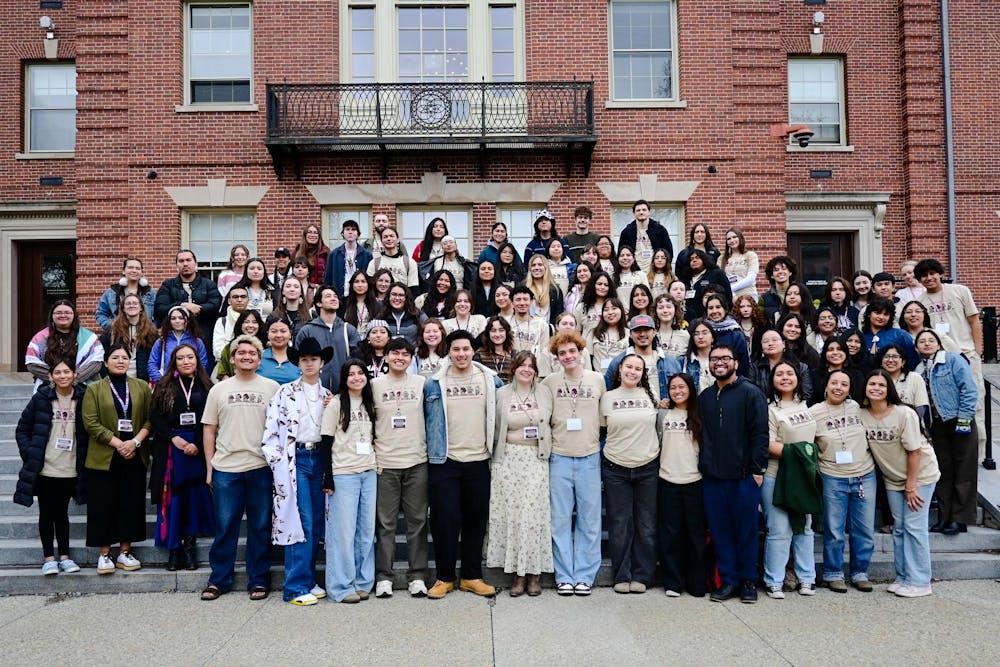This past weekend, Brown hosted over 150 students from across the nation for the twice-annual Ivy Native Conference.
The four-day conference was organized by Natives at Brown, a group of Native American and Indigenous-identifying students at Brown and the Rhode Island School of Design. The event featured a series of speakers and workshops centered around “Indigenous Resistance and Activism,” which was the theme of this year’s conference.
“It’s really nice to have the opportunity and the space to gather to see all the different native communities and students that are actively engaged in their own work across different campuses,” said Sophia Francesco, a fifth-year architecture undergraduate at RISD.
The annual conference aims to “recognize the power and presence of Native and Indigenous students across elite and higher education” institutions, wrote Noah Martinez ’27, one of the conference representatives for Natives at Brown, in an email to The Herald.
Jolie Tsinnijinnie, a student representative from the Pueblo Action Alliance in New Mexico, said Indigenous people are often overlooked or “invisible,” so “getting a chance to see them and hear what they do in their communities was very inspiring and very powerful.”
On Friday, students heard from members of the Narragansett Indian Tribe who outlined the tribe’s history and shared stories about their experiences.
In a speech at the conference, Sherenté Harris ’23 AM’24 GS explained that Providence was not “founded through friendship.” Rather, Narragansett land was broken up and sold, and some members of the tribe were forcibly indentured, Harris said.
But Harris emphasized that despite efforts to detribalize the Narragansett people, they still remained united through traditions and community gatherings.
“Our people continue to gather and self-govern as a sovereign nation,” Harris told conference attendees.
Harris’s father, Thawn Harris, was one of the keynote speakers at the conference. In his speech, he shared his personal experience with resistance: He was arrested while trying to prevent law enforcement entry during a 2003 state trooper raid on the tribe’s recently opened smoke shop.
Harris was eventually found innocent, but the eight-month trial still took a toll on his family, he said.
According to Kira Padilla, another student representative from the Pueblo Action Alliance, Indigenous people around the world continue to experience similar incidents. Stories like Thawn Harris’s remind “us that we have to keep fighting,” Padilla said.
On Saturday, conference participants were able to attend the 22nd Annual Brown Spring Thaw Powwow, which was organized by Natives at Brown and the Brown Center for Students of Color’s Native Heritage Series. Though not officially affiliated with the conference, the powwow featured traditional dances, songs, drums, foods and crafts.
“In the very unpredictable and scary state of the world, gathering as a community is more important than ever,” Martinez wrote. “Our shared experiences and our strength as Native people will always prevail.”
The final keynote lecture on Sunday was centered around the impacts of climate change on the Inuit people, specifically in the Southwest Alaska region.
Charitie Ropati — a Columbia engineering graduate from the Native Village of Kongiganak, Alaska — explained how melting permafrost from rising temperatures has a significant effect on Arctic Indigenous communities, resulting in flooding and coastal erosion.
Ropati also outlined what she called colonialism’s “devastating impacts” on the Yup’ik people in Alaska. “This trauma lives on for generations,” she said. “These are things that our people are still healing from.”
In addition to the keynote speeches, the conference also featured four workshops on topics ranging from the removal of Native mascots in popular culture to Indigenous Peoples’ Day.
Alicia Gallegos, a climate justice organizer for the Pueblo Action Alliance, attended a workshop discussing the history of the Indigenous Pueblo people of New Mexico.
“It’s really nice to hear these stories of not just resiliency, but resistance,” she said. The “community organizing that we do today is just a continuation of that legacy of resistance and fighting to protect what we have.”





